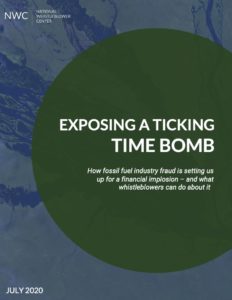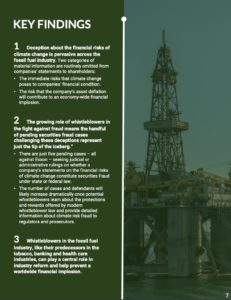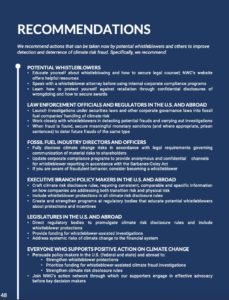The disruption of the earth’s climate is one of the greatest challenges facing our society. Greenhouse gas emissions are continuing to increase, as evidenced by a Global Carbon Project report finding that in 2019, despite impressive progress with clean energy, global fossil fuel emissions had increased for the third straight year. While behavioral changes related to COVID-19 caused a small drop in emissions, without structural changes, a rebound in emissions is almost certain.
These emissions are already having dramatic impacts. Sea levels are rising. Animal and plant species are rapidly going extinct. Natural phenomena like hurricanes and forest fires are becoming increasingly more violent. And the impacts of greenhouse gas emissions are not spread evenly. Those who have contributed the least to the problem – the poorest communities around the world and the generations to come – will experience the greatest impacts.
Climate change poses an enormous threat to our economy and quality of life, and readily available solutions are not being implemented fast enough to head off the worst damage. That’s why the National Whistleblower Center (NWC) launched our Climate Corruption Campaign in January 2020, with a focus on the fossil fuel and timber industries as well as their professional enablers, including the securities and banking industries.
The Climate Corruption Campaign’s fossil fuel work is centered around one central concept: a vast percentage of the fossil fuel industry is not willing or able to make a shift toward decarbonization at the pace and scale needed to meet Paris targets or otherwise meaningfully contribute to climate stabilization.
The industry’s business model and past practices suggest that the continued profitability of these companies, and ability to attract investment and policy support, is achieved in significant part through fraud, bribery and other corruption.
Further strengthening whistleblower laws and enacting mandatory climate disclosure requirements is necessary to protect the environment and the economy, but whistleblowers don’t have to wait. If companies attempt to mislead regulators, investors, or others about their activities, whistleblowers can use powerful U.S. whistleblower laws to report this. NWC is educating and assisting whistleblowers in the fossil fuel industry with evidence of climate-related risks and other potentially fraudulent information. Learn more about how we help whistleblowers find an attorney here.
Widespread Fraud in the Fossil Fuel Industry
A significant part of the responsibility for the world’s greenhouse gas emissions rests with a small number of resource extraction companies. For example, a 2017 study by the nonprofit CDP shows that nearly two thirds of greenhouse gases added to the environment since the Industrial Revolution can be traced back to just 90 fossil fuel companies.
Recently, fossil fuel companies have pledged to reduce the pollution driving climate change, but does this mean that a meaningful transition to a carbon-constrained future is truly underway inside the industry?
In July 2020, NWC released a report detailing widespread deception by fossil fuel executives regarding the financial risks of climate change. The report describes why deception about companies’ preparedness for climate change risks represents a ticking time bomb that, if not addressed, could contribute to worldwide economic devastation. This is where whistleblowers come in.
The report, entitled Exposing a Ticking Time Bomb: How Fossil Fuel Industry Fraud is Setting Us Up for a Financial Implosion – and What Whistleblowers Can Do About It, calls for collaborative investigations by whistleblowers and law enforcement authorities of likely securities fraud violations.
- Exposing a Ticking Time Bomb
- Key Findings
- Recommendations
It found that deception about the financial risks of climate change is pervasive across the fossil fuel industry, with two categories of material information routinely omitted from companies’ statements to shareholders: (1) the immediate risks that climate change poses to companies’ financial condition, and (2) the risk that the company’s asset deflation will contribute to an economy -wide financial implosion.
Fossil fuel companies, fearful of losing access to investment capital and loans, are highly motivated to conceal their exposure to these risks. As a result, some companies may deceive investors and other stakeholders. Specifically, these deceptions generally fall into three categories:
- Overstating the value of reserves
- Understating environmental liabilities
- Understating physical risks to infrastructure
Concealment of climate risks is a matter of great public interest because when it is successful, it harms investors, the environment and the economy. Investors who provide capital to these companies suffer because they invest based on a false sense of the companies’ readiness for the transition to a low-carbon economy and for the physical shocks of climate change. This deception undercuts efforts to address climate change because it slows the shift of investments to businesses developing and deploying low-carbon technologies. It harms the economy by leaving financial institutions such as banks and insurers less prepared for the stresses of rapid asset deflation.
“In light of the deceptions we found, the handful of pending fraud cases challenging climate risk disclosures by fossil fuel companies are probably just the tip of the iceberg,” said John Kostyack, lead author of the report. “We anticipate that the number of cases and defendants will increase dramatically in the near future once potential whistleblowers learn about the benefits of modern whistleblower laws and begin providing information to regulators and prosecutors about climate risk deceptions along the lines of those outlined in our report.”
Recent climate change cases filed by states like New York and Massachusetts, shareholders, and others only further demonstrate the growing consensus: fighting corporate fraud is especially critical in the midst of climate change crisis.
How Whistleblowers Can Help
Whistleblowers have a proven track record in battling corruption in other arenas. Many high-impact prosecutions have taken place only because whistleblowers delivered otherwise-unavailable evidence to law enforcement officials and have produced billions and penalties. In FY 2020 alone, the US government recovered over USD 2.2 billion through its civil fraud program. Whistleblowers were directly responsible for reporting over USD 1.6 billion recovered, making them the source of 75% of civil fraud recovered that year.
And whistleblowers can have industry-changing impact. One of the best-known examples is Bradley Birkenfeld, who was the first international banker to blow the whistle on secret Swiss bank accounts. His disclosures resulted in unprecedented recoveries for U.S. taxpayers, with over $780 million dollars in civil fines and penalties paid by UBS and over $5 billion dollars in collections from U.S. taxpayers who had illegally held “undeclared” offshore accounts in Switzerland and other countries. As a result of his whistleblowing, these secret accounts are no longer available for corrupt US taxpayers to hide their earnings, and the Swiss government was ultimately forced to change its treaty with the United States in order to turn over the names of nearly five thousand Americans who held illegal offshore accounts.
He received a reward of $104 million under the IRS Whistleblower Program for his invaluable assistance with the case, the largest whistleblower reward ever given. His reward has helped to drive massive growth in prosecutions of securities, commodities and tax fraud by demonstrating to both whistleblowers and prosecutors the critical role of this economic incentive to motivate high-level executives to take the substantial risk of exposing crime.
There are similar stories across industries and sectors – whistleblowers who gave disclosures that changed corporate behavior for the better. You can learn more about those here.
Now is the time to harness the powerful whistleblower laws to rein in corruption in the fossil fuel industry. U.S. laws are uniquely well-suited for enlisting citizens to help fight global environmental crime. There have been a host of laws enacted by the U.S. Congress and the states in the past few decades to encourage whistleblowers to report corporate fraud to authorities. The best of these laws, such as state and federal False Claims Acts and the federal laws on tax, securities and commodities fraud, allow whistleblowers to report crimes without revealing their identities.
They also provide financial rewards to whistleblowers for contributing to successful prosecutions, with the size of the reward linked to the size of the monetary sanctions recovered and the importance of the whistleblower’s evidence to the case. These rewards are available to whistleblowers regardless of U.S. citizenship and apply to prosecutions against U.S. companies as well as foreign companies doing business in the U.S. Leveraging this powerful system of laws could provide a revolutionary new approach to combating the climate crisis. Learn more about the laws that can be used by climate change whistleblowers here.
REPORT CLIMATE CRIMES CONFIDENTIALLY
“Whistleblowers have proven time and again that they are the key to exposing and prosecuting law-breaking,” said Stephen M. Kohn, NWC Board Chairman and leading whistleblower attorney. “With the protections and incentives provided by the Dodd-Frank Act and other whistleblower laws, we have the ingredients we need to confront likely fraud in the fossil fuel industry.”
NWC is also working to strengthen laws for climate change whistleblowers around the world. In March 2021, a coalition of anti-corruption advocates, including NWC, also wrote letters to each European Union member country urging the parliaments to explicitly recognize and protect climate whistleblowers in their transposition of the 2019 Whistleblowing Directive. The letters note that as climate change issues impact a wide spectrum of laws, rules, and regulations, which are constantly evolving, these parliaments must enact provisions that are flexible enough to cover this developing area.
Only company insiders know the extent to which the impact of climate change-related risks on financial assets and other deceptions have been illegally concealed from shareholders, regulators, and the public – it is critical that they are empowered to step forward through robust whistleblower protections and awards.


